A Comprehensive Report on the Crisis in the Hospitality Industry
VerifiedAdded on 2023/01/20
|14
|3747
|94
Report
AI Summary
This report delves into the organizational structure and current challenges within the hospitality industry. It highlights issues in employee retention, particularly the impact of employee satisfaction and work environment. The report examines the significance of various departments, including rooms, food and beverage, marketing, human resources, and accounting, and how they contribute to the overall efficiency and performance of hotels. It evaluates factors affecting the industry, such as recruitment difficulties, turnover rates, and workplace harassment, and explores how these factors contribute to a crisis in the industry. The report further discusses management strategies to address these challenges, focusing on pay packages and addressing employee dissatisfaction. The report also highlights the importance of marketing and social media strategies in the hospitality industry and provides recommendations for overcoming the challenges.
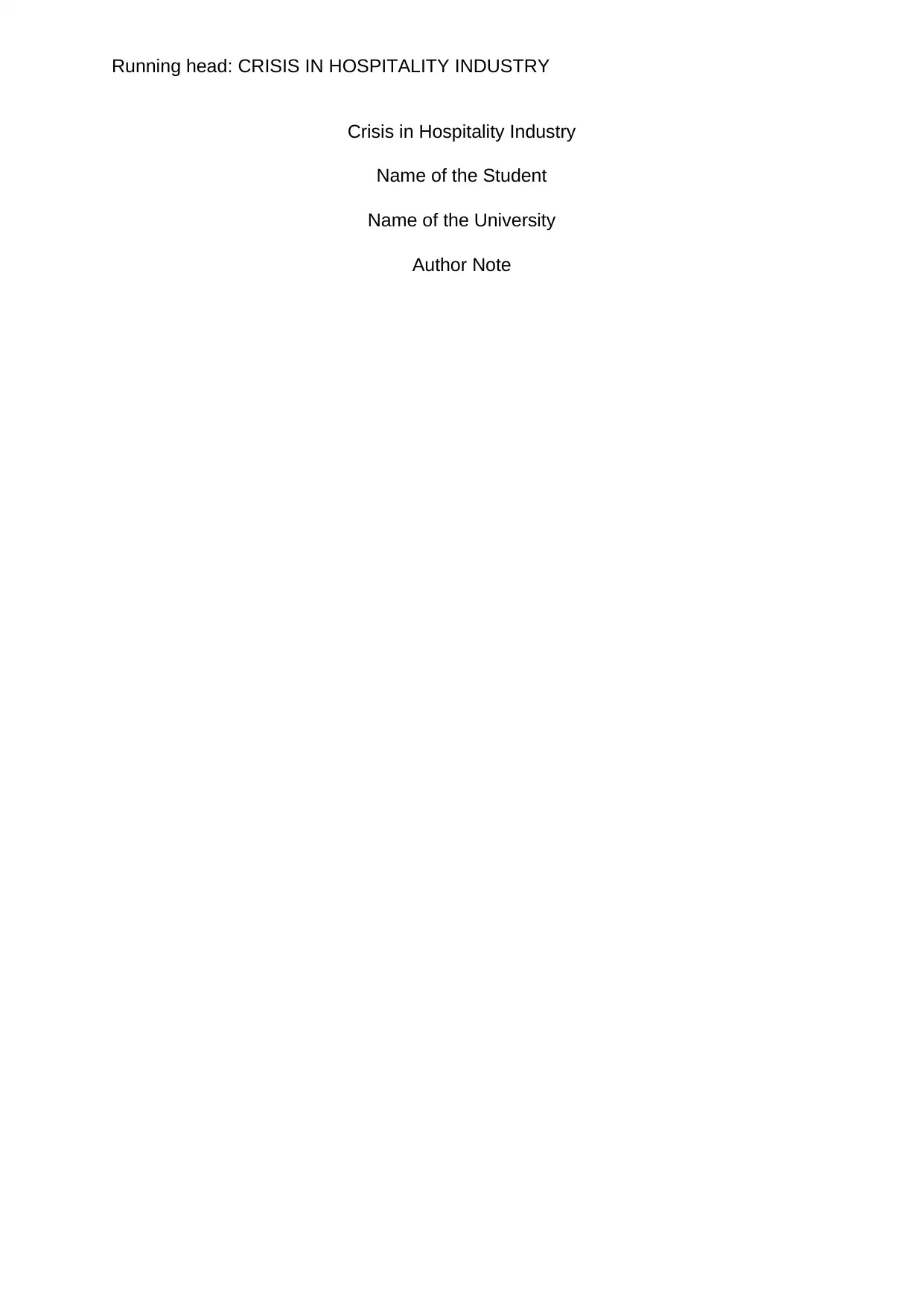
Running head: CRISIS IN HOSPITALITY INDUSTRY
Crisis in Hospitality Industry
Name of the Student
Name of the University
Author Note
Crisis in Hospitality Industry
Name of the Student
Name of the University
Author Note
Paraphrase This Document
Need a fresh take? Get an instant paraphrase of this document with our AI Paraphraser
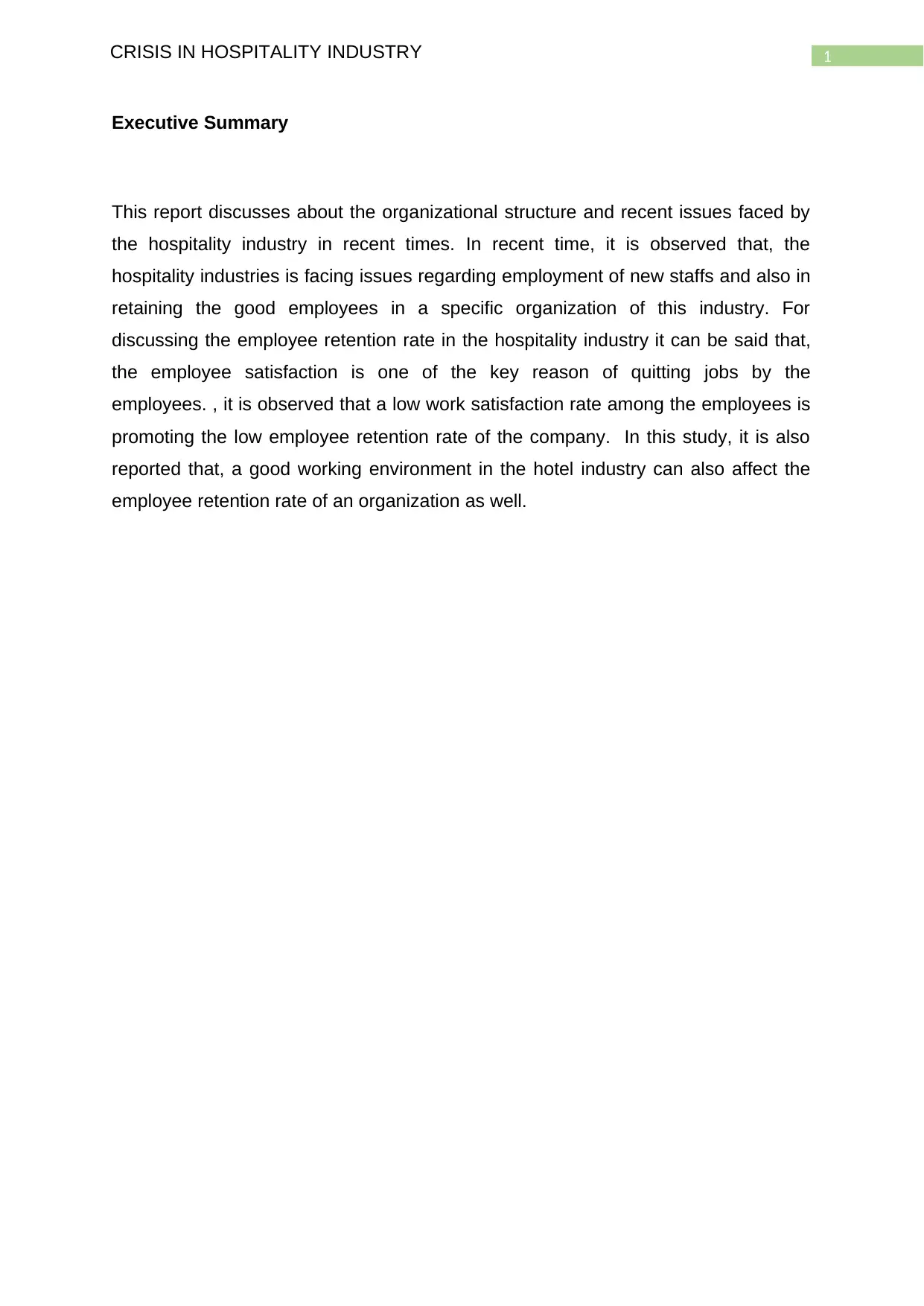
1CRISIS IN HOSPITALITY INDUSTRY
Executive Summary
This report discusses about the organizational structure and recent issues faced by
the hospitality industry in recent times. In recent time, it is observed that, the
hospitality industries is facing issues regarding employment of new staffs and also in
retaining the good employees in a specific organization of this industry. For
discussing the employee retention rate in the hospitality industry it can be said that,
the employee satisfaction is one of the key reason of quitting jobs by the
employees. , it is observed that a low work satisfaction rate among the employees is
promoting the low employee retention rate of the company. In this study, it is also
reported that, a good working environment in the hotel industry can also affect the
employee retention rate of an organization as well.
Executive Summary
This report discusses about the organizational structure and recent issues faced by
the hospitality industry in recent times. In recent time, it is observed that, the
hospitality industries is facing issues regarding employment of new staffs and also in
retaining the good employees in a specific organization of this industry. For
discussing the employee retention rate in the hospitality industry it can be said that,
the employee satisfaction is one of the key reason of quitting jobs by the
employees. , it is observed that a low work satisfaction rate among the employees is
promoting the low employee retention rate of the company. In this study, it is also
reported that, a good working environment in the hotel industry can also affect the
employee retention rate of an organization as well.
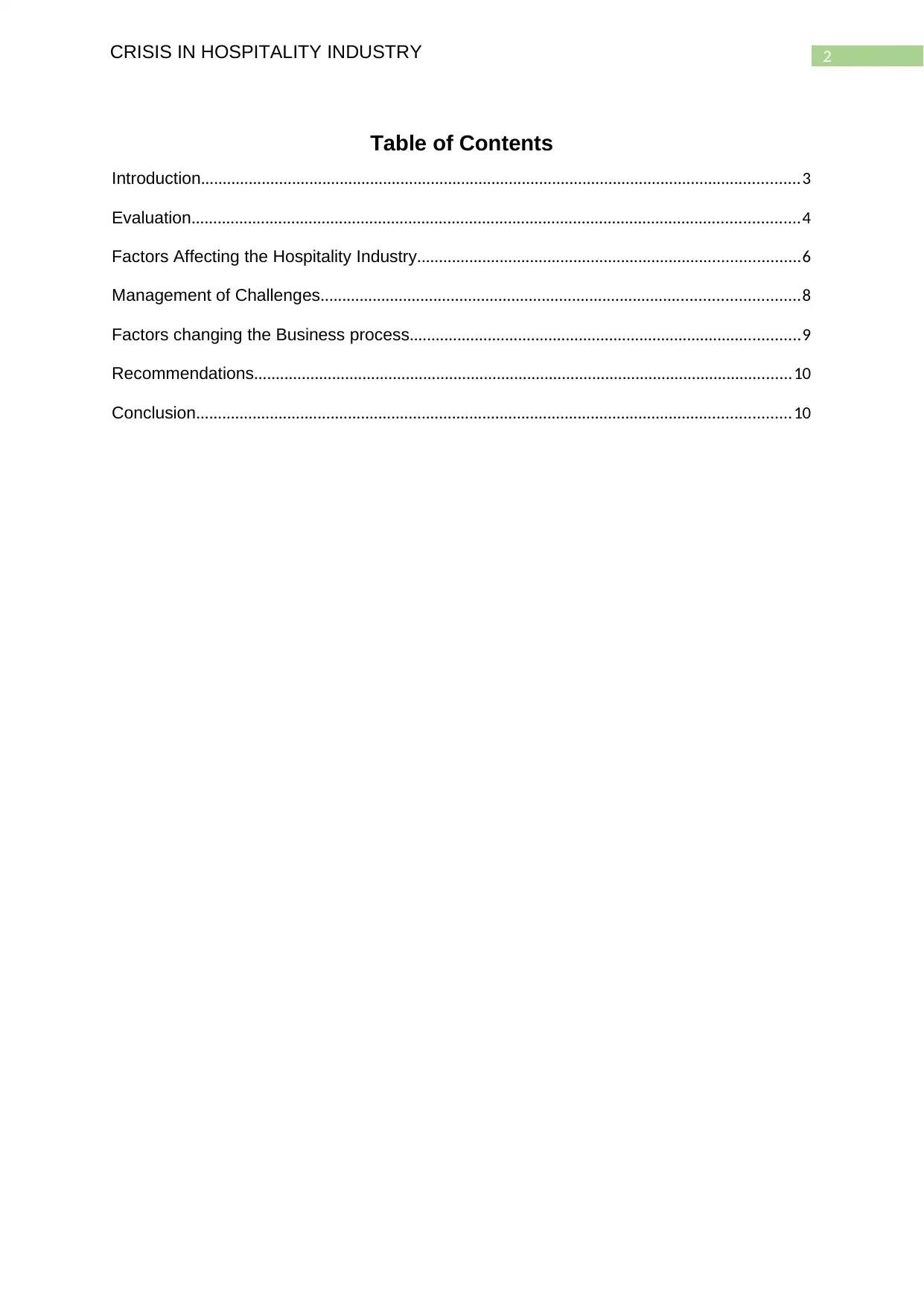
2CRISIS IN HOSPITALITY INDUSTRY
Table of Contents
Introduction..........................................................................................................................................3
Evaluation............................................................................................................................................4
Factors Affecting the Hospitality Industry........................................................................................6
Management of Challenges..............................................................................................................8
Factors changing the Business process..........................................................................................9
Recommendations............................................................................................................................10
Conclusion.........................................................................................................................................10
Table of Contents
Introduction..........................................................................................................................................3
Evaluation............................................................................................................................................4
Factors Affecting the Hospitality Industry........................................................................................6
Management of Challenges..............................................................................................................8
Factors changing the Business process..........................................................................................9
Recommendations............................................................................................................................10
Conclusion.........................................................................................................................................10
⊘ This is a preview!⊘
Do you want full access?
Subscribe today to unlock all pages.

Trusted by 1+ million students worldwide
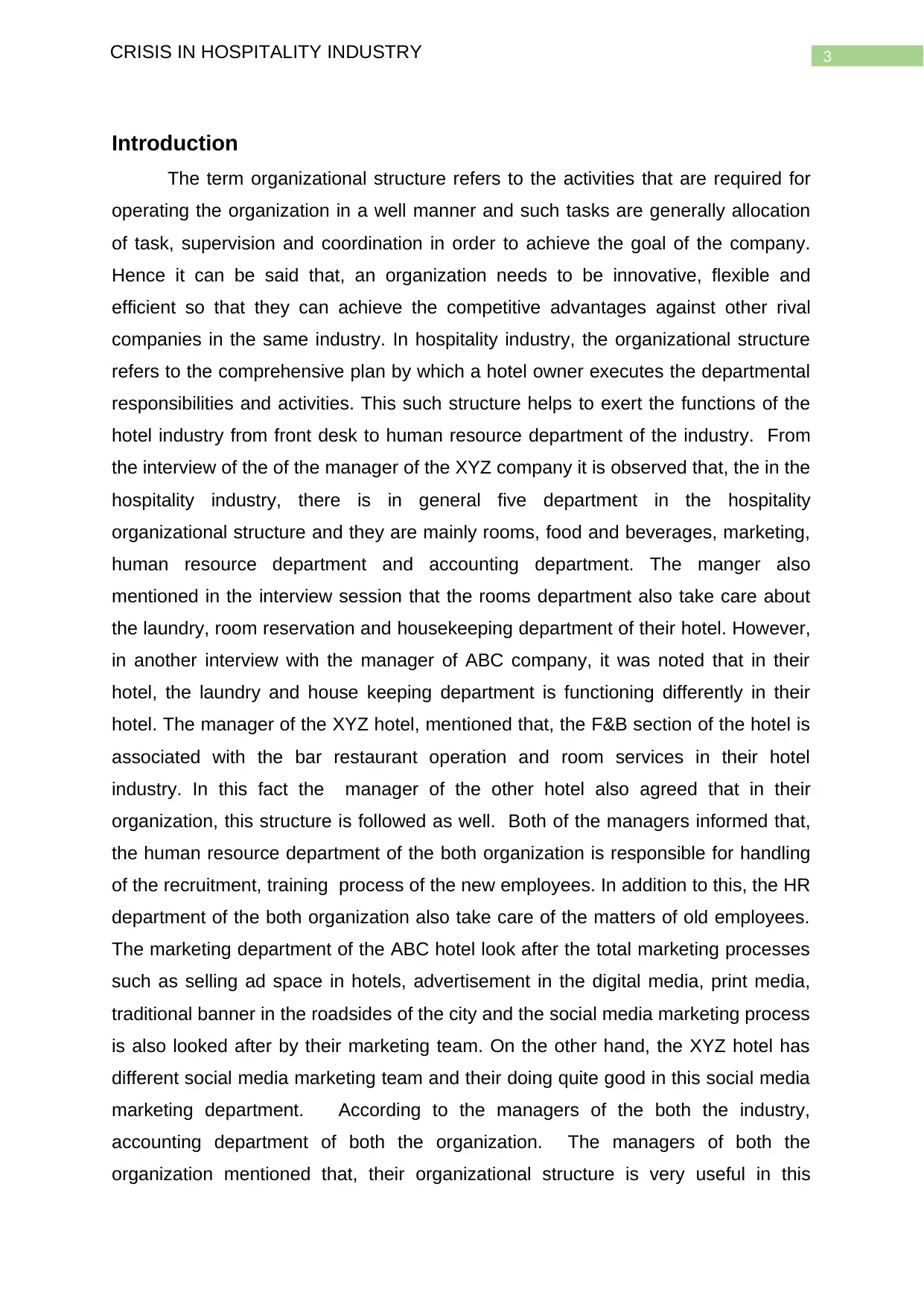
3CRISIS IN HOSPITALITY INDUSTRY
Introduction
The term organizational structure refers to the activities that are required for
operating the organization in a well manner and such tasks are generally allocation
of task, supervision and coordination in order to achieve the goal of the company.
Hence it can be said that, an organization needs to be innovative, flexible and
efficient so that they can achieve the competitive advantages against other rival
companies in the same industry. In hospitality industry, the organizational structure
refers to the comprehensive plan by which a hotel owner executes the departmental
responsibilities and activities. This such structure helps to exert the functions of the
hotel industry from front desk to human resource department of the industry. From
the interview of the of the manager of the XYZ company it is observed that, the in the
hospitality industry, there is in general five department in the hospitality
organizational structure and they are mainly rooms, food and beverages, marketing,
human resource department and accounting department. The manger also
mentioned in the interview session that the rooms department also take care about
the laundry, room reservation and housekeeping department of their hotel. However,
in another interview with the manager of ABC company, it was noted that in their
hotel, the laundry and house keeping department is functioning differently in their
hotel. The manager of the XYZ hotel, mentioned that, the F&B section of the hotel is
associated with the bar restaurant operation and room services in their hotel
industry. In this fact the manager of the other hotel also agreed that in their
organization, this structure is followed as well. Both of the managers informed that,
the human resource department of the both organization is responsible for handling
of the recruitment, training process of the new employees. In addition to this, the HR
department of the both organization also take care of the matters of old employees.
The marketing department of the ABC hotel look after the total marketing processes
such as selling ad space in hotels, advertisement in the digital media, print media,
traditional banner in the roadsides of the city and the social media marketing process
is also looked after by their marketing team. On the other hand, the XYZ hotel has
different social media marketing team and their doing quite good in this social media
marketing department. According to the managers of the both the industry,
accounting department of both the organization. The managers of both the
organization mentioned that, their organizational structure is very useful in this
Introduction
The term organizational structure refers to the activities that are required for
operating the organization in a well manner and such tasks are generally allocation
of task, supervision and coordination in order to achieve the goal of the company.
Hence it can be said that, an organization needs to be innovative, flexible and
efficient so that they can achieve the competitive advantages against other rival
companies in the same industry. In hospitality industry, the organizational structure
refers to the comprehensive plan by which a hotel owner executes the departmental
responsibilities and activities. This such structure helps to exert the functions of the
hotel industry from front desk to human resource department of the industry. From
the interview of the of the manager of the XYZ company it is observed that, the in the
hospitality industry, there is in general five department in the hospitality
organizational structure and they are mainly rooms, food and beverages, marketing,
human resource department and accounting department. The manger also
mentioned in the interview session that the rooms department also take care about
the laundry, room reservation and housekeeping department of their hotel. However,
in another interview with the manager of ABC company, it was noted that in their
hotel, the laundry and house keeping department is functioning differently in their
hotel. The manager of the XYZ hotel, mentioned that, the F&B section of the hotel is
associated with the bar restaurant operation and room services in their hotel
industry. In this fact the manager of the other hotel also agreed that in their
organization, this structure is followed as well. Both of the managers informed that,
the human resource department of the both organization is responsible for handling
of the recruitment, training process of the new employees. In addition to this, the HR
department of the both organization also take care of the matters of old employees.
The marketing department of the ABC hotel look after the total marketing processes
such as selling ad space in hotels, advertisement in the digital media, print media,
traditional banner in the roadsides of the city and the social media marketing process
is also looked after by their marketing team. On the other hand, the XYZ hotel has
different social media marketing team and their doing quite good in this social media
marketing department. According to the managers of the both the industry,
accounting department of both the organization. The managers of both the
organization mentioned that, their organizational structure is very useful in this
Paraphrase This Document
Need a fresh take? Get an instant paraphrase of this document with our AI Paraphraser
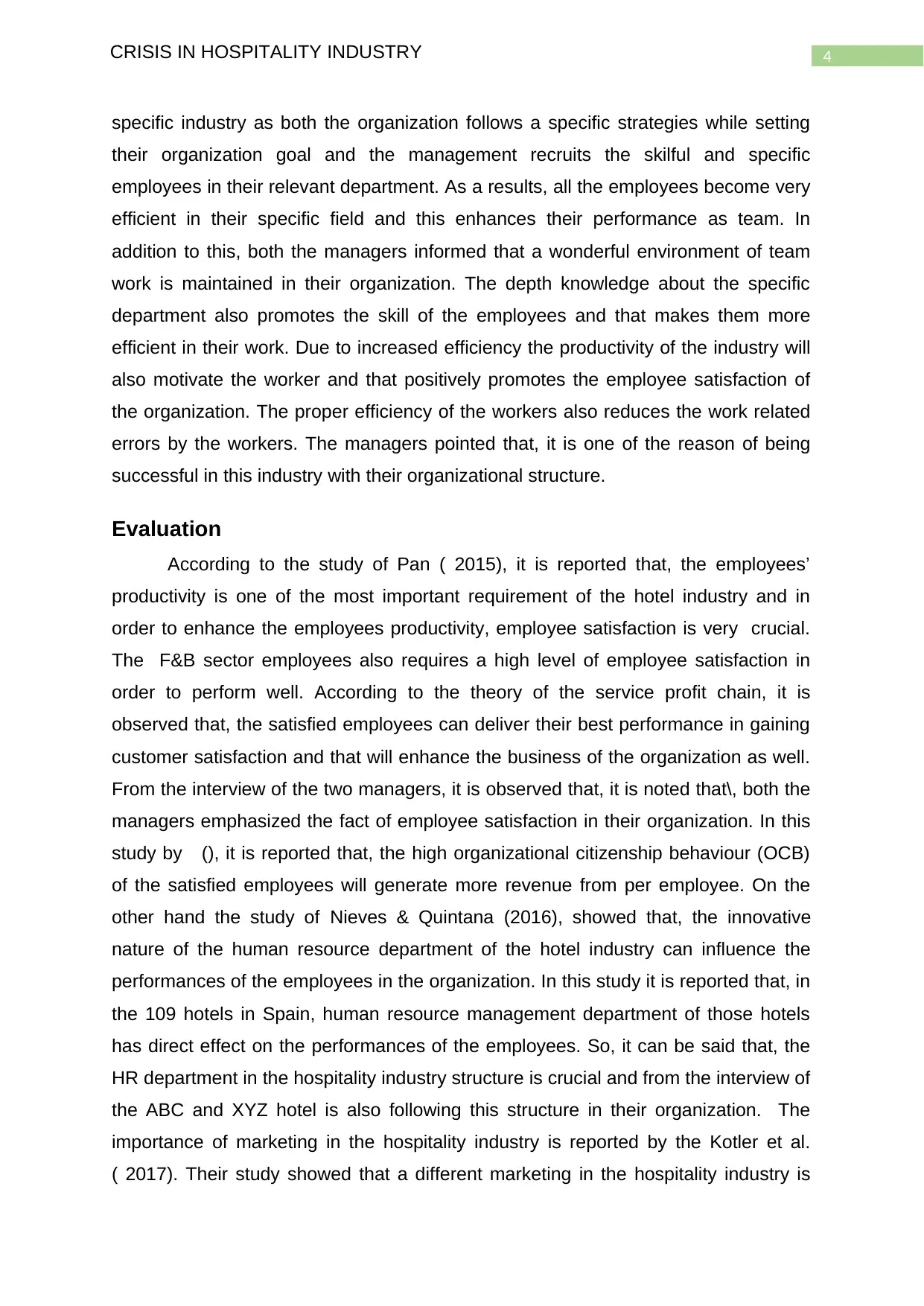
4CRISIS IN HOSPITALITY INDUSTRY
specific industry as both the organization follows a specific strategies while setting
their organization goal and the management recruits the skilful and specific
employees in their relevant department. As a results, all the employees become very
efficient in their specific field and this enhances their performance as team. In
addition to this, both the managers informed that a wonderful environment of team
work is maintained in their organization. The depth knowledge about the specific
department also promotes the skill of the employees and that makes them more
efficient in their work. Due to increased efficiency the productivity of the industry will
also motivate the worker and that positively promotes the employee satisfaction of
the organization. The proper efficiency of the workers also reduces the work related
errors by the workers. The managers pointed that, it is one of the reason of being
successful in this industry with their organizational structure.
Evaluation
According to the study of Pan ( 2015), it is reported that, the employees’
productivity is one of the most important requirement of the hotel industry and in
order to enhance the employees productivity, employee satisfaction is very crucial.
The F&B sector employees also requires a high level of employee satisfaction in
order to perform well. According to the theory of the service profit chain, it is
observed that, the satisfied employees can deliver their best performance in gaining
customer satisfaction and that will enhance the business of the organization as well.
From the interview of the two managers, it is observed that, it is noted that\, both the
managers emphasized the fact of employee satisfaction in their organization. In this
study by (), it is reported that, the high organizational citizenship behaviour (OCB)
of the satisfied employees will generate more revenue from per employee. On the
other hand the study of Nieves & Quintana (2016), showed that, the innovative
nature of the human resource department of the hotel industry can influence the
performances of the employees in the organization. In this study it is reported that, in
the 109 hotels in Spain, human resource management department of those hotels
has direct effect on the performances of the employees. So, it can be said that, the
HR department in the hospitality industry structure is crucial and from the interview of
the ABC and XYZ hotel is also following this structure in their organization. The
importance of marketing in the hospitality industry is reported by the Kotler et al.
( 2017). Their study showed that a different marketing in the hospitality industry is
specific industry as both the organization follows a specific strategies while setting
their organization goal and the management recruits the skilful and specific
employees in their relevant department. As a results, all the employees become very
efficient in their specific field and this enhances their performance as team. In
addition to this, both the managers informed that a wonderful environment of team
work is maintained in their organization. The depth knowledge about the specific
department also promotes the skill of the employees and that makes them more
efficient in their work. Due to increased efficiency the productivity of the industry will
also motivate the worker and that positively promotes the employee satisfaction of
the organization. The proper efficiency of the workers also reduces the work related
errors by the workers. The managers pointed that, it is one of the reason of being
successful in this industry with their organizational structure.
Evaluation
According to the study of Pan ( 2015), it is reported that, the employees’
productivity is one of the most important requirement of the hotel industry and in
order to enhance the employees productivity, employee satisfaction is very crucial.
The F&B sector employees also requires a high level of employee satisfaction in
order to perform well. According to the theory of the service profit chain, it is
observed that, the satisfied employees can deliver their best performance in gaining
customer satisfaction and that will enhance the business of the organization as well.
From the interview of the two managers, it is observed that, it is noted that\, both the
managers emphasized the fact of employee satisfaction in their organization. In this
study by (), it is reported that, the high organizational citizenship behaviour (OCB)
of the satisfied employees will generate more revenue from per employee. On the
other hand the study of Nieves & Quintana (2016), showed that, the innovative
nature of the human resource department of the hotel industry can influence the
performances of the employees in the organization. In this study it is reported that, in
the 109 hotels in Spain, human resource management department of those hotels
has direct effect on the performances of the employees. So, it can be said that, the
HR department in the hospitality industry structure is crucial and from the interview of
the ABC and XYZ hotel is also following this structure in their organization. The
importance of marketing in the hospitality industry is reported by the Kotler et al.
( 2017). Their study showed that a different marketing in the hospitality industry is
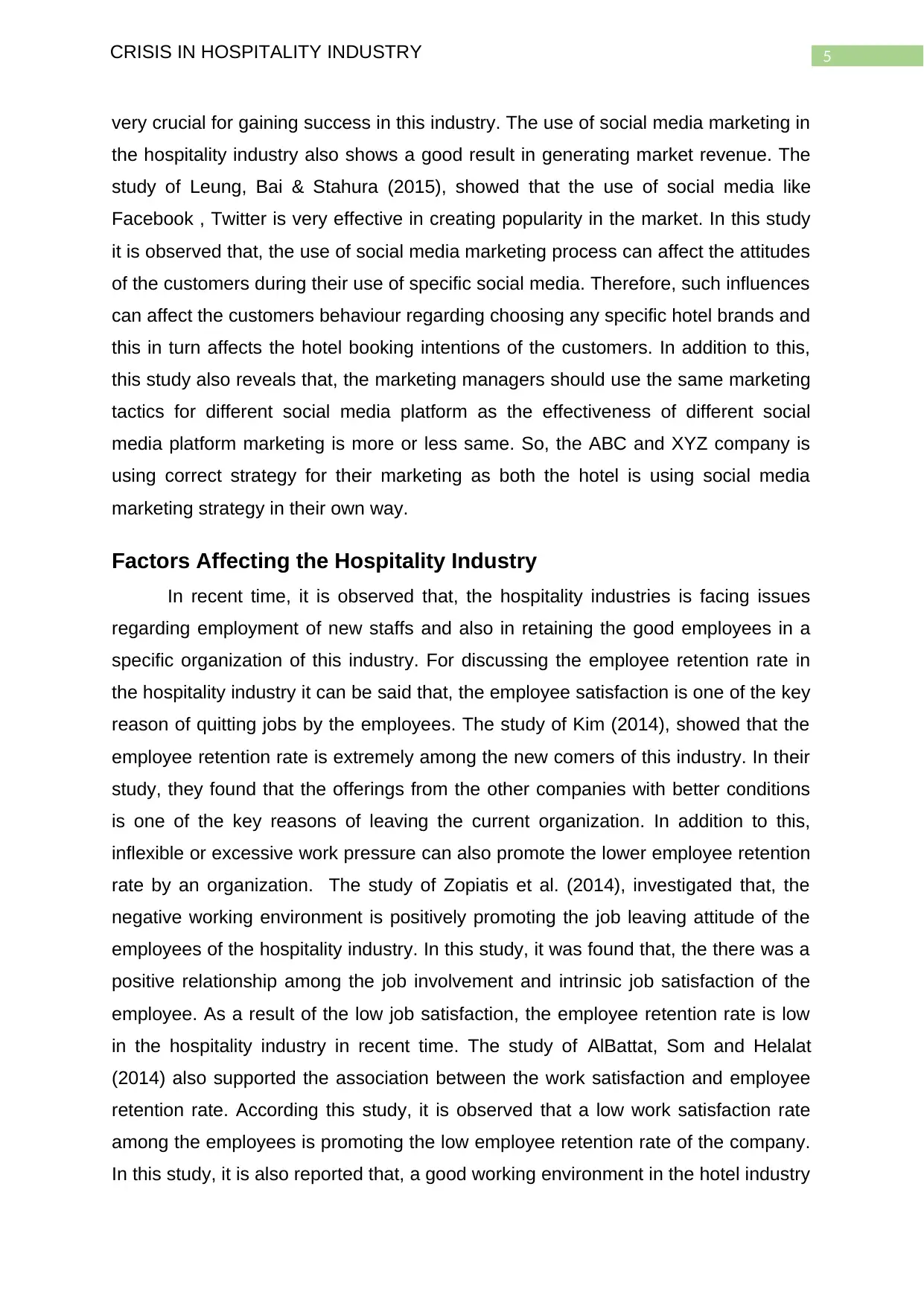
5CRISIS IN HOSPITALITY INDUSTRY
very crucial for gaining success in this industry. The use of social media marketing in
the hospitality industry also shows a good result in generating market revenue. The
study of Leung, Bai & Stahura (2015), showed that the use of social media like
Facebook , Twitter is very effective in creating popularity in the market. In this study
it is observed that, the use of social media marketing process can affect the attitudes
of the customers during their use of specific social media. Therefore, such influences
can affect the customers behaviour regarding choosing any specific hotel brands and
this in turn affects the hotel booking intentions of the customers. In addition to this,
this study also reveals that, the marketing managers should use the same marketing
tactics for different social media platform as the effectiveness of different social
media platform marketing is more or less same. So, the ABC and XYZ company is
using correct strategy for their marketing as both the hotel is using social media
marketing strategy in their own way.
Factors Affecting the Hospitality Industry
In recent time, it is observed that, the hospitality industries is facing issues
regarding employment of new staffs and also in retaining the good employees in a
specific organization of this industry. For discussing the employee retention rate in
the hospitality industry it can be said that, the employee satisfaction is one of the key
reason of quitting jobs by the employees. The study of Kim (2014), showed that the
employee retention rate is extremely among the new comers of this industry. In their
study, they found that the offerings from the other companies with better conditions
is one of the key reasons of leaving the current organization. In addition to this,
inflexible or excessive work pressure can also promote the lower employee retention
rate by an organization. The study of Zopiatis et al. (2014), investigated that, the
negative working environment is positively promoting the job leaving attitude of the
employees of the hospitality industry. In this study, it was found that, the there was a
positive relationship among the job involvement and intrinsic job satisfaction of the
employee. As a result of the low job satisfaction, the employee retention rate is low
in the hospitality industry in recent time. The study of AlBattat, Som and Helalat
(2014) also supported the association between the work satisfaction and employee
retention rate. According this study, it is observed that a low work satisfaction rate
among the employees is promoting the low employee retention rate of the company.
In this study, it is also reported that, a good working environment in the hotel industry
very crucial for gaining success in this industry. The use of social media marketing in
the hospitality industry also shows a good result in generating market revenue. The
study of Leung, Bai & Stahura (2015), showed that the use of social media like
Facebook , Twitter is very effective in creating popularity in the market. In this study
it is observed that, the use of social media marketing process can affect the attitudes
of the customers during their use of specific social media. Therefore, such influences
can affect the customers behaviour regarding choosing any specific hotel brands and
this in turn affects the hotel booking intentions of the customers. In addition to this,
this study also reveals that, the marketing managers should use the same marketing
tactics for different social media platform as the effectiveness of different social
media platform marketing is more or less same. So, the ABC and XYZ company is
using correct strategy for their marketing as both the hotel is using social media
marketing strategy in their own way.
Factors Affecting the Hospitality Industry
In recent time, it is observed that, the hospitality industries is facing issues
regarding employment of new staffs and also in retaining the good employees in a
specific organization of this industry. For discussing the employee retention rate in
the hospitality industry it can be said that, the employee satisfaction is one of the key
reason of quitting jobs by the employees. The study of Kim (2014), showed that the
employee retention rate is extremely among the new comers of this industry. In their
study, they found that the offerings from the other companies with better conditions
is one of the key reasons of leaving the current organization. In addition to this,
inflexible or excessive work pressure can also promote the lower employee retention
rate by an organization. The study of Zopiatis et al. (2014), investigated that, the
negative working environment is positively promoting the job leaving attitude of the
employees of the hospitality industry. In this study, it was found that, the there was a
positive relationship among the job involvement and intrinsic job satisfaction of the
employee. As a result of the low job satisfaction, the employee retention rate is low
in the hospitality industry in recent time. The study of AlBattat, Som and Helalat
(2014) also supported the association between the work satisfaction and employee
retention rate. According this study, it is observed that a low work satisfaction rate
among the employees is promoting the low employee retention rate of the company.
In this study, it is also reported that, a good working environment in the hotel industry
⊘ This is a preview!⊘
Do you want full access?
Subscribe today to unlock all pages.

Trusted by 1+ million students worldwide
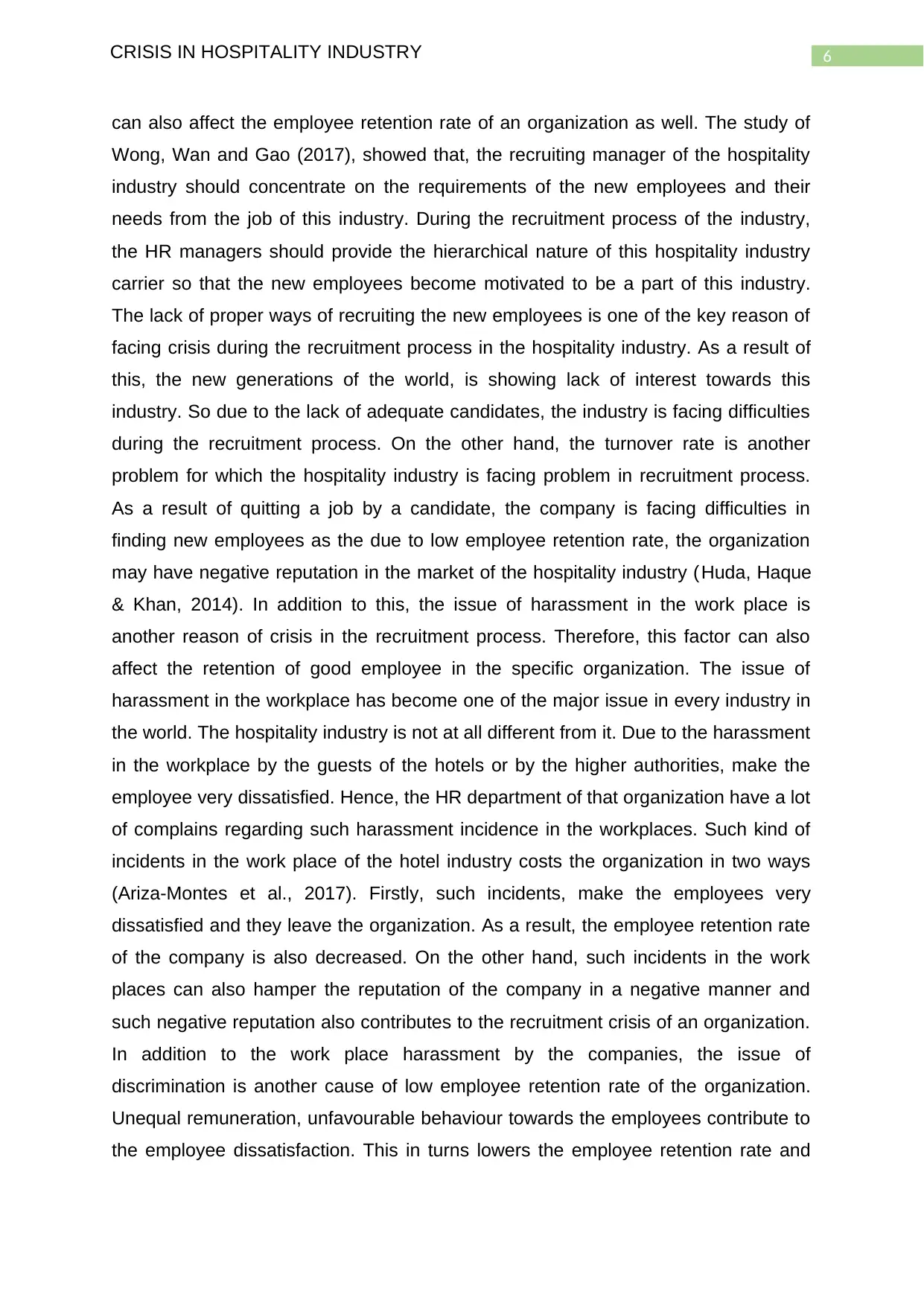
6CRISIS IN HOSPITALITY INDUSTRY
can also affect the employee retention rate of an organization as well. The study of
Wong, Wan and Gao (2017), showed that, the recruiting manager of the hospitality
industry should concentrate on the requirements of the new employees and their
needs from the job of this industry. During the recruitment process of the industry,
the HR managers should provide the hierarchical nature of this hospitality industry
carrier so that the new employees become motivated to be a part of this industry.
The lack of proper ways of recruiting the new employees is one of the key reason of
facing crisis during the recruitment process in the hospitality industry. As a result of
this, the new generations of the world, is showing lack of interest towards this
industry. So due to the lack of adequate candidates, the industry is facing difficulties
during the recruitment process. On the other hand, the turnover rate is another
problem for which the hospitality industry is facing problem in recruitment process.
As a result of quitting a job by a candidate, the company is facing difficulties in
finding new employees as the due to low employee retention rate, the organization
may have negative reputation in the market of the hospitality industry (Huda, Haque
& Khan, 2014). In addition to this, the issue of harassment in the work place is
another reason of crisis in the recruitment process. Therefore, this factor can also
affect the retention of good employee in the specific organization. The issue of
harassment in the workplace has become one of the major issue in every industry in
the world. The hospitality industry is not at all different from it. Due to the harassment
in the workplace by the guests of the hotels or by the higher authorities, make the
employee very dissatisfied. Hence, the HR department of that organization have a lot
of complains regarding such harassment incidence in the workplaces. Such kind of
incidents in the work place of the hotel industry costs the organization in two ways
(Ariza-Montes et al., 2017). Firstly, such incidents, make the employees very
dissatisfied and they leave the organization. As a result, the employee retention rate
of the company is also decreased. On the other hand, such incidents in the work
places can also hamper the reputation of the company in a negative manner and
such negative reputation also contributes to the recruitment crisis of an organization.
In addition to the work place harassment by the companies, the issue of
discrimination is another cause of low employee retention rate of the organization.
Unequal remuneration, unfavourable behaviour towards the employees contribute to
the employee dissatisfaction. This in turns lowers the employee retention rate and
can also affect the employee retention rate of an organization as well. The study of
Wong, Wan and Gao (2017), showed that, the recruiting manager of the hospitality
industry should concentrate on the requirements of the new employees and their
needs from the job of this industry. During the recruitment process of the industry,
the HR managers should provide the hierarchical nature of this hospitality industry
carrier so that the new employees become motivated to be a part of this industry.
The lack of proper ways of recruiting the new employees is one of the key reason of
facing crisis during the recruitment process in the hospitality industry. As a result of
this, the new generations of the world, is showing lack of interest towards this
industry. So due to the lack of adequate candidates, the industry is facing difficulties
during the recruitment process. On the other hand, the turnover rate is another
problem for which the hospitality industry is facing problem in recruitment process.
As a result of quitting a job by a candidate, the company is facing difficulties in
finding new employees as the due to low employee retention rate, the organization
may have negative reputation in the market of the hospitality industry (Huda, Haque
& Khan, 2014). In addition to this, the issue of harassment in the work place is
another reason of crisis in the recruitment process. Therefore, this factor can also
affect the retention of good employee in the specific organization. The issue of
harassment in the workplace has become one of the major issue in every industry in
the world. The hospitality industry is not at all different from it. Due to the harassment
in the workplace by the guests of the hotels or by the higher authorities, make the
employee very dissatisfied. Hence, the HR department of that organization have a lot
of complains regarding such harassment incidence in the workplaces. Such kind of
incidents in the work place of the hotel industry costs the organization in two ways
(Ariza-Montes et al., 2017). Firstly, such incidents, make the employees very
dissatisfied and they leave the organization. As a result, the employee retention rate
of the company is also decreased. On the other hand, such incidents in the work
places can also hamper the reputation of the company in a negative manner and
such negative reputation also contributes to the recruitment crisis of an organization.
In addition to the work place harassment by the companies, the issue of
discrimination is another cause of low employee retention rate of the organization.
Unequal remuneration, unfavourable behaviour towards the employees contribute to
the employee dissatisfaction. This in turns lowers the employee retention rate and
Paraphrase This Document
Need a fresh take? Get an instant paraphrase of this document with our AI Paraphraser
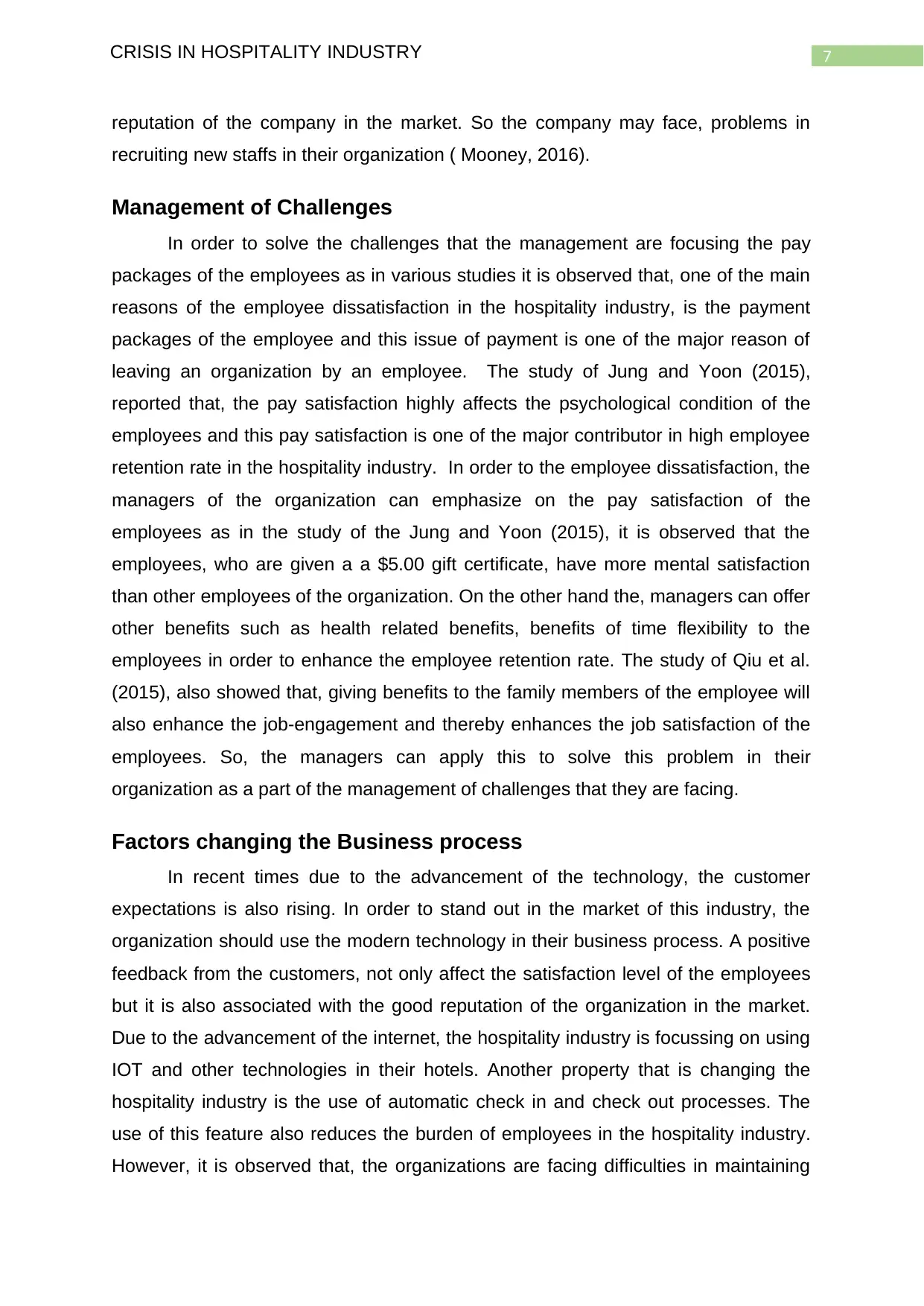
7CRISIS IN HOSPITALITY INDUSTRY
reputation of the company in the market. So the company may face, problems in
recruiting new staffs in their organization ( Mooney, 2016).
Management of Challenges
In order to solve the challenges that the management are focusing the pay
packages of the employees as in various studies it is observed that, one of the main
reasons of the employee dissatisfaction in the hospitality industry, is the payment
packages of the employee and this issue of payment is one of the major reason of
leaving an organization by an employee. The study of Jung and Yoon (2015),
reported that, the pay satisfaction highly affects the psychological condition of the
employees and this pay satisfaction is one of the major contributor in high employee
retention rate in the hospitality industry. In order to the employee dissatisfaction, the
managers of the organization can emphasize on the pay satisfaction of the
employees as in the study of the Jung and Yoon (2015), it is observed that the
employees, who are given a a $5.00 gift certificate, have more mental satisfaction
than other employees of the organization. On the other hand the, managers can offer
other benefits such as health related benefits, benefits of time flexibility to the
employees in order to enhance the employee retention rate. The study of Qiu et al.
(2015), also showed that, giving benefits to the family members of the employee will
also enhance the job-engagement and thereby enhances the job satisfaction of the
employees. So, the managers can apply this to solve this problem in their
organization as a part of the management of challenges that they are facing.
Factors changing the Business process
In recent times due to the advancement of the technology, the customer
expectations is also rising. In order to stand out in the market of this industry, the
organization should use the modern technology in their business process. A positive
feedback from the customers, not only affect the satisfaction level of the employees
but it is also associated with the good reputation of the organization in the market.
Due to the advancement of the internet, the hospitality industry is focussing on using
IOT and other technologies in their hotels. Another property that is changing the
hospitality industry is the use of automatic check in and check out processes. The
use of this feature also reduces the burden of employees in the hospitality industry.
However, it is observed that, the organizations are facing difficulties in maintaining
reputation of the company in the market. So the company may face, problems in
recruiting new staffs in their organization ( Mooney, 2016).
Management of Challenges
In order to solve the challenges that the management are focusing the pay
packages of the employees as in various studies it is observed that, one of the main
reasons of the employee dissatisfaction in the hospitality industry, is the payment
packages of the employee and this issue of payment is one of the major reason of
leaving an organization by an employee. The study of Jung and Yoon (2015),
reported that, the pay satisfaction highly affects the psychological condition of the
employees and this pay satisfaction is one of the major contributor in high employee
retention rate in the hospitality industry. In order to the employee dissatisfaction, the
managers of the organization can emphasize on the pay satisfaction of the
employees as in the study of the Jung and Yoon (2015), it is observed that the
employees, who are given a a $5.00 gift certificate, have more mental satisfaction
than other employees of the organization. On the other hand the, managers can offer
other benefits such as health related benefits, benefits of time flexibility to the
employees in order to enhance the employee retention rate. The study of Qiu et al.
(2015), also showed that, giving benefits to the family members of the employee will
also enhance the job-engagement and thereby enhances the job satisfaction of the
employees. So, the managers can apply this to solve this problem in their
organization as a part of the management of challenges that they are facing.
Factors changing the Business process
In recent times due to the advancement of the technology, the customer
expectations is also rising. In order to stand out in the market of this industry, the
organization should use the modern technology in their business process. A positive
feedback from the customers, not only affect the satisfaction level of the employees
but it is also associated with the good reputation of the organization in the market.
Due to the advancement of the internet, the hospitality industry is focussing on using
IOT and other technologies in their hotels. Another property that is changing the
hospitality industry is the use of automatic check in and check out processes. The
use of this feature also reduces the burden of employees in the hospitality industry.
However, it is observed that, the organizations are facing difficulties in maintaining
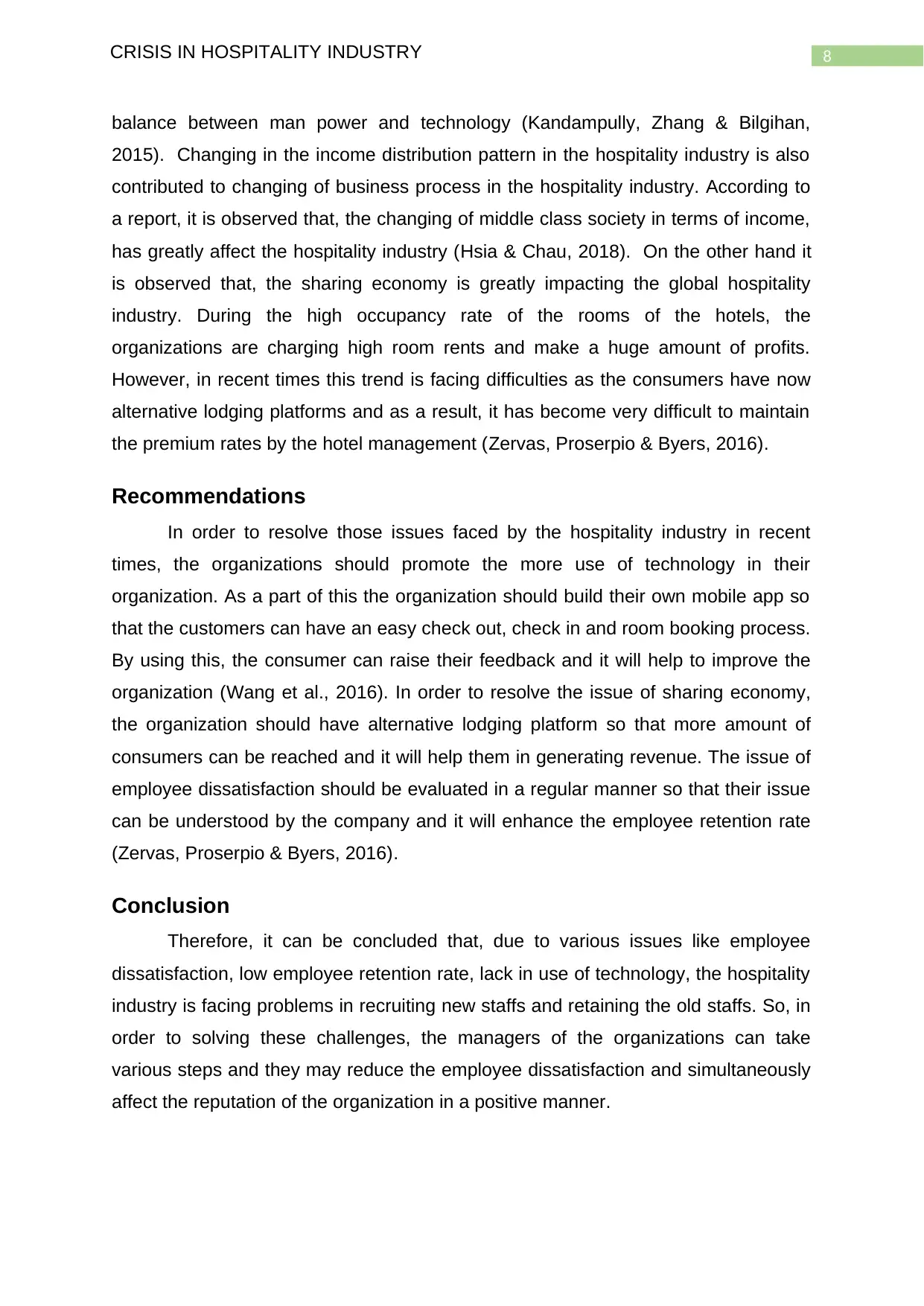
8CRISIS IN HOSPITALITY INDUSTRY
balance between man power and technology (Kandampully, Zhang & Bilgihan,
2015). Changing in the income distribution pattern in the hospitality industry is also
contributed to changing of business process in the hospitality industry. According to
a report, it is observed that, the changing of middle class society in terms of income,
has greatly affect the hospitality industry (Hsia & Chau, 2018). On the other hand it
is observed that, the sharing economy is greatly impacting the global hospitality
industry. During the high occupancy rate of the rooms of the hotels, the
organizations are charging high room rents and make a huge amount of profits.
However, in recent times this trend is facing difficulties as the consumers have now
alternative lodging platforms and as a result, it has become very difficult to maintain
the premium rates by the hotel management (Zervas, Proserpio & Byers, 2016).
Recommendations
In order to resolve those issues faced by the hospitality industry in recent
times, the organizations should promote the more use of technology in their
organization. As a part of this the organization should build their own mobile app so
that the customers can have an easy check out, check in and room booking process.
By using this, the consumer can raise their feedback and it will help to improve the
organization (Wang et al., 2016). In order to resolve the issue of sharing economy,
the organization should have alternative lodging platform so that more amount of
consumers can be reached and it will help them in generating revenue. The issue of
employee dissatisfaction should be evaluated in a regular manner so that their issue
can be understood by the company and it will enhance the employee retention rate
(Zervas, Proserpio & Byers, 2016).
Conclusion
Therefore, it can be concluded that, due to various issues like employee
dissatisfaction, low employee retention rate, lack in use of technology, the hospitality
industry is facing problems in recruiting new staffs and retaining the old staffs. So, in
order to solving these challenges, the managers of the organizations can take
various steps and they may reduce the employee dissatisfaction and simultaneously
affect the reputation of the organization in a positive manner.
balance between man power and technology (Kandampully, Zhang & Bilgihan,
2015). Changing in the income distribution pattern in the hospitality industry is also
contributed to changing of business process in the hospitality industry. According to
a report, it is observed that, the changing of middle class society in terms of income,
has greatly affect the hospitality industry (Hsia & Chau, 2018). On the other hand it
is observed that, the sharing economy is greatly impacting the global hospitality
industry. During the high occupancy rate of the rooms of the hotels, the
organizations are charging high room rents and make a huge amount of profits.
However, in recent times this trend is facing difficulties as the consumers have now
alternative lodging platforms and as a result, it has become very difficult to maintain
the premium rates by the hotel management (Zervas, Proserpio & Byers, 2016).
Recommendations
In order to resolve those issues faced by the hospitality industry in recent
times, the organizations should promote the more use of technology in their
organization. As a part of this the organization should build their own mobile app so
that the customers can have an easy check out, check in and room booking process.
By using this, the consumer can raise their feedback and it will help to improve the
organization (Wang et al., 2016). In order to resolve the issue of sharing economy,
the organization should have alternative lodging platform so that more amount of
consumers can be reached and it will help them in generating revenue. The issue of
employee dissatisfaction should be evaluated in a regular manner so that their issue
can be understood by the company and it will enhance the employee retention rate
(Zervas, Proserpio & Byers, 2016).
Conclusion
Therefore, it can be concluded that, due to various issues like employee
dissatisfaction, low employee retention rate, lack in use of technology, the hospitality
industry is facing problems in recruiting new staffs and retaining the old staffs. So, in
order to solving these challenges, the managers of the organizations can take
various steps and they may reduce the employee dissatisfaction and simultaneously
affect the reputation of the organization in a positive manner.
⊘ This is a preview!⊘
Do you want full access?
Subscribe today to unlock all pages.

Trusted by 1+ million students worldwide
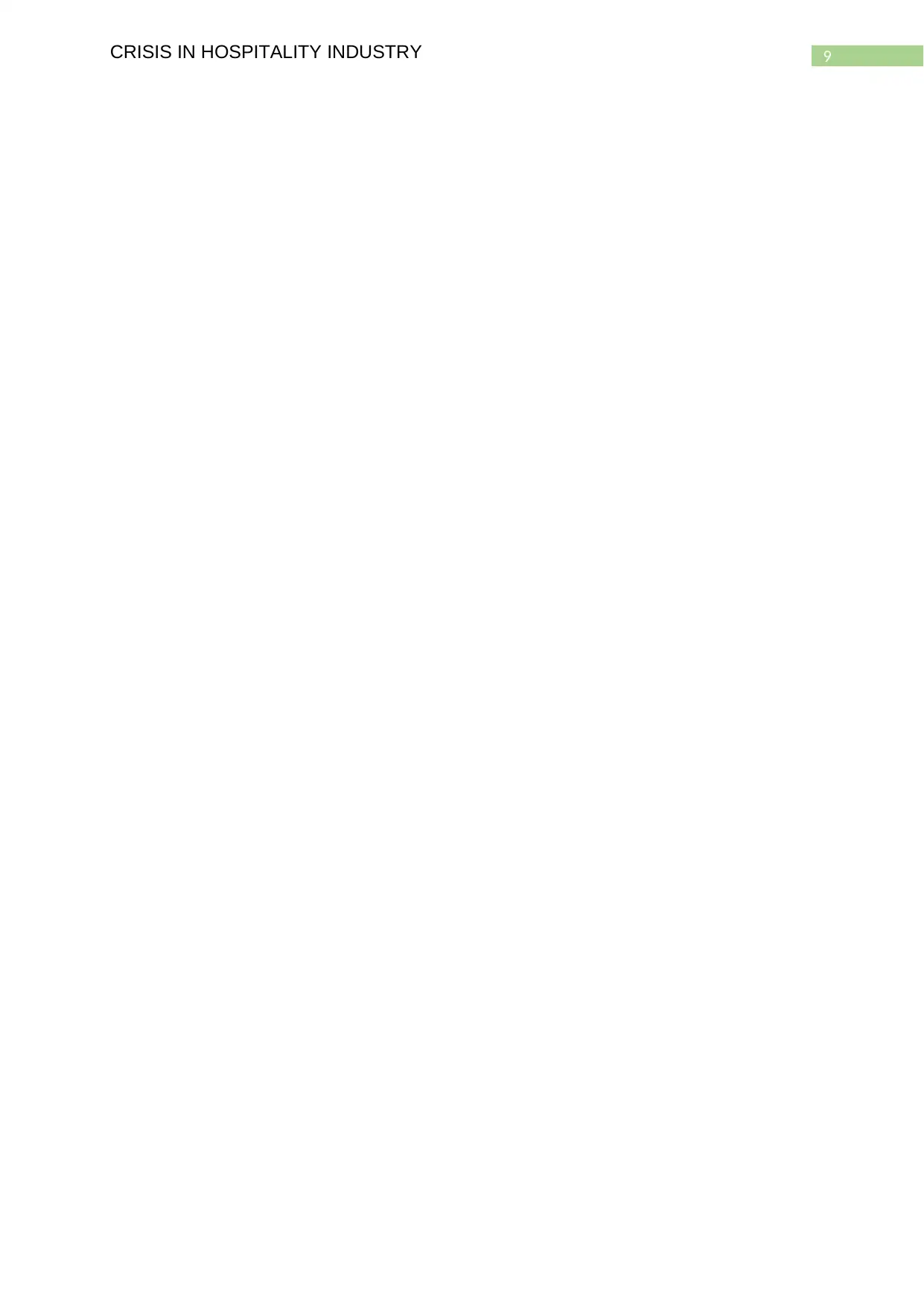
9CRISIS IN HOSPITALITY INDUSTRY
Paraphrase This Document
Need a fresh take? Get an instant paraphrase of this document with our AI Paraphraser
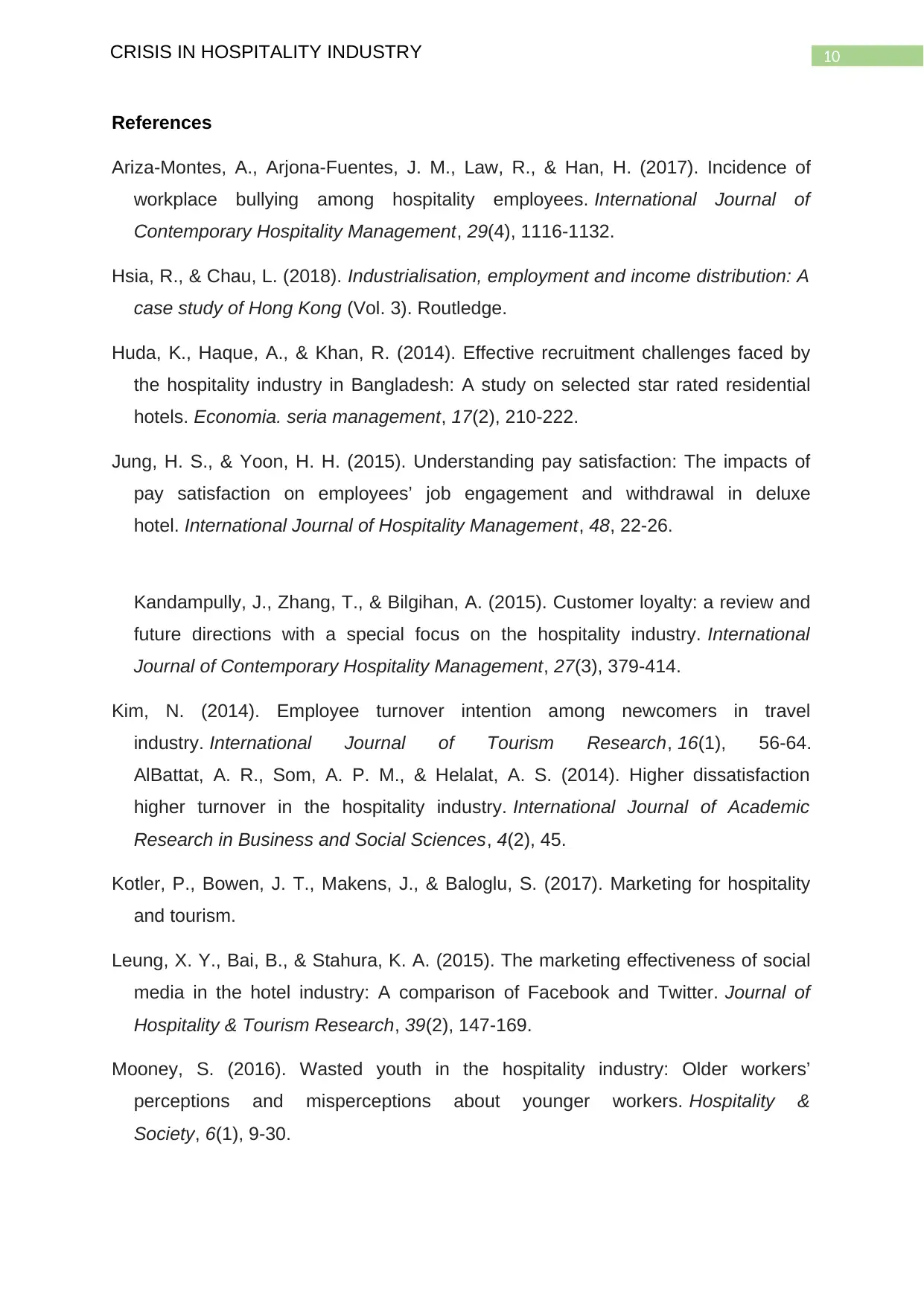
10CRISIS IN HOSPITALITY INDUSTRY
References
Ariza-Montes, A., Arjona-Fuentes, J. M., Law, R., & Han, H. (2017). Incidence of
workplace bullying among hospitality employees. International Journal of
Contemporary Hospitality Management, 29(4), 1116-1132.
Hsia, R., & Chau, L. (2018). Industrialisation, employment and income distribution: A
case study of Hong Kong (Vol. 3). Routledge.
Huda, K., Haque, A., & Khan, R. (2014). Effective recruitment challenges faced by
the hospitality industry in Bangladesh: A study on selected star rated residential
hotels. Economia. seria management, 17(2), 210-222.
Jung, H. S., & Yoon, H. H. (2015). Understanding pay satisfaction: The impacts of
pay satisfaction on employees’ job engagement and withdrawal in deluxe
hotel. International Journal of Hospitality Management, 48, 22-26.
Kandampully, J., Zhang, T., & Bilgihan, A. (2015). Customer loyalty: a review and
future directions with a special focus on the hospitality industry. International
Journal of Contemporary Hospitality Management, 27(3), 379-414.
Kim, N. (2014). Employee turnover intention among newcomers in travel
industry. International Journal of Tourism Research, 16(1), 56-64.
AlBattat, A. R., Som, A. P. M., & Helalat, A. S. (2014). Higher dissatisfaction
higher turnover in the hospitality industry. International Journal of Academic
Research in Business and Social Sciences, 4(2), 45.
Kotler, P., Bowen, J. T., Makens, J., & Baloglu, S. (2017). Marketing for hospitality
and tourism.
Leung, X. Y., Bai, B., & Stahura, K. A. (2015). The marketing effectiveness of social
media in the hotel industry: A comparison of Facebook and Twitter. Journal of
Hospitality & Tourism Research, 39(2), 147-169.
Mooney, S. (2016). Wasted youth in the hospitality industry: Older workers’
perceptions and misperceptions about younger workers. Hospitality &
Society, 6(1), 9-30.
References
Ariza-Montes, A., Arjona-Fuentes, J. M., Law, R., & Han, H. (2017). Incidence of
workplace bullying among hospitality employees. International Journal of
Contemporary Hospitality Management, 29(4), 1116-1132.
Hsia, R., & Chau, L. (2018). Industrialisation, employment and income distribution: A
case study of Hong Kong (Vol. 3). Routledge.
Huda, K., Haque, A., & Khan, R. (2014). Effective recruitment challenges faced by
the hospitality industry in Bangladesh: A study on selected star rated residential
hotels. Economia. seria management, 17(2), 210-222.
Jung, H. S., & Yoon, H. H. (2015). Understanding pay satisfaction: The impacts of
pay satisfaction on employees’ job engagement and withdrawal in deluxe
hotel. International Journal of Hospitality Management, 48, 22-26.
Kandampully, J., Zhang, T., & Bilgihan, A. (2015). Customer loyalty: a review and
future directions with a special focus on the hospitality industry. International
Journal of Contemporary Hospitality Management, 27(3), 379-414.
Kim, N. (2014). Employee turnover intention among newcomers in travel
industry. International Journal of Tourism Research, 16(1), 56-64.
AlBattat, A. R., Som, A. P. M., & Helalat, A. S. (2014). Higher dissatisfaction
higher turnover in the hospitality industry. International Journal of Academic
Research in Business and Social Sciences, 4(2), 45.
Kotler, P., Bowen, J. T., Makens, J., & Baloglu, S. (2017). Marketing for hospitality
and tourism.
Leung, X. Y., Bai, B., & Stahura, K. A. (2015). The marketing effectiveness of social
media in the hotel industry: A comparison of Facebook and Twitter. Journal of
Hospitality & Tourism Research, 39(2), 147-169.
Mooney, S. (2016). Wasted youth in the hospitality industry: Older workers’
perceptions and misperceptions about younger workers. Hospitality &
Society, 6(1), 9-30.
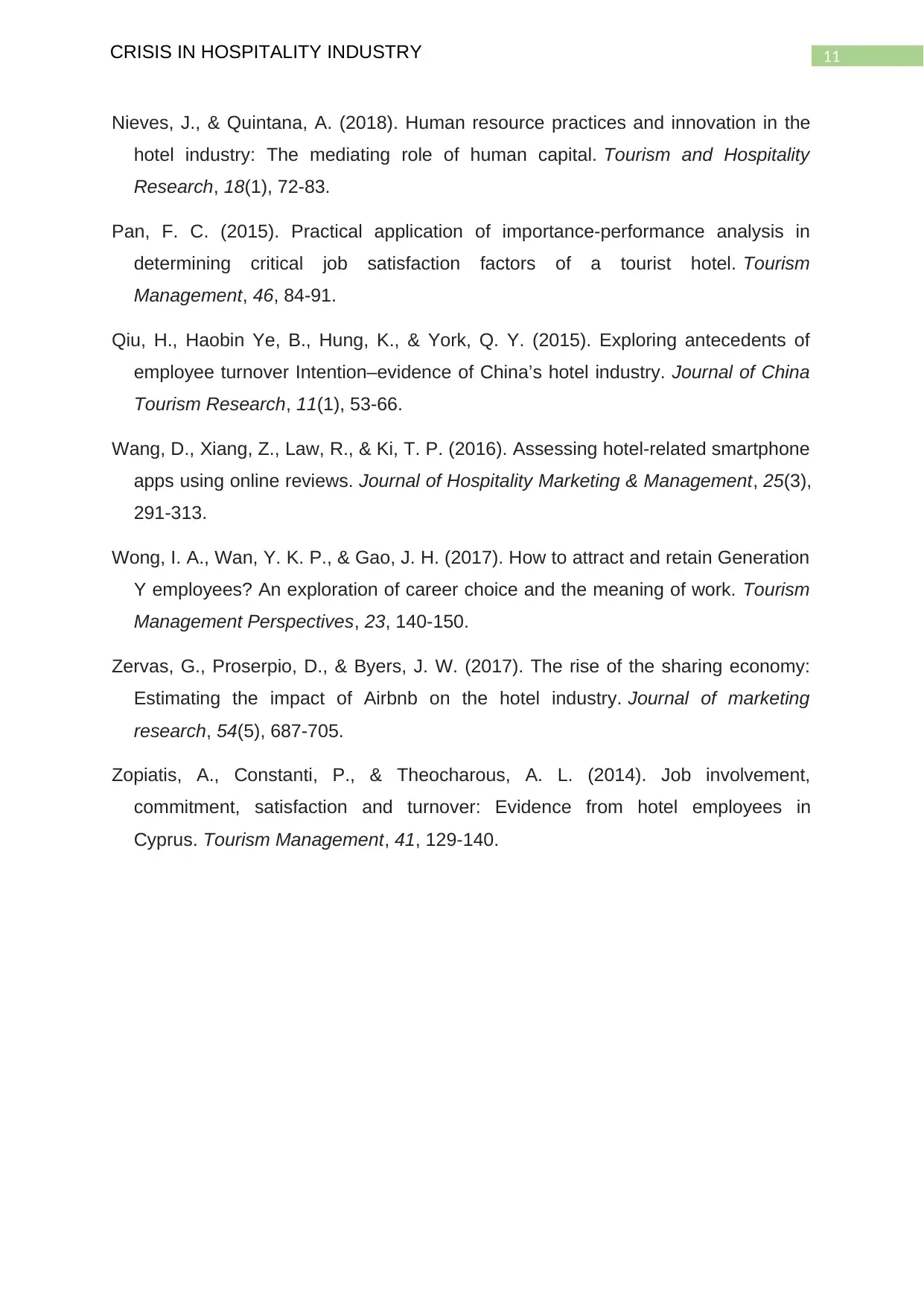
11CRISIS IN HOSPITALITY INDUSTRY
Nieves, J., & Quintana, A. (2018). Human resource practices and innovation in the
hotel industry: The mediating role of human capital. Tourism and Hospitality
Research, 18(1), 72-83.
Pan, F. C. (2015). Practical application of importance-performance analysis in
determining critical job satisfaction factors of a tourist hotel. Tourism
Management, 46, 84-91.
Qiu, H., Haobin Ye, B., Hung, K., & York, Q. Y. (2015). Exploring antecedents of
employee turnover Intention–evidence of China’s hotel industry. Journal of China
Tourism Research, 11(1), 53-66.
Wang, D., Xiang, Z., Law, R., & Ki, T. P. (2016). Assessing hotel-related smartphone
apps using online reviews. Journal of Hospitality Marketing & Management, 25(3),
291-313.
Wong, I. A., Wan, Y. K. P., & Gao, J. H. (2017). How to attract and retain Generation
Y employees? An exploration of career choice and the meaning of work. Tourism
Management Perspectives, 23, 140-150.
Zervas, G., Proserpio, D., & Byers, J. W. (2017). The rise of the sharing economy:
Estimating the impact of Airbnb on the hotel industry. Journal of marketing
research, 54(5), 687-705.
Zopiatis, A., Constanti, P., & Theocharous, A. L. (2014). Job involvement,
commitment, satisfaction and turnover: Evidence from hotel employees in
Cyprus. Tourism Management, 41, 129-140.
Nieves, J., & Quintana, A. (2018). Human resource practices and innovation in the
hotel industry: The mediating role of human capital. Tourism and Hospitality
Research, 18(1), 72-83.
Pan, F. C. (2015). Practical application of importance-performance analysis in
determining critical job satisfaction factors of a tourist hotel. Tourism
Management, 46, 84-91.
Qiu, H., Haobin Ye, B., Hung, K., & York, Q. Y. (2015). Exploring antecedents of
employee turnover Intention–evidence of China’s hotel industry. Journal of China
Tourism Research, 11(1), 53-66.
Wang, D., Xiang, Z., Law, R., & Ki, T. P. (2016). Assessing hotel-related smartphone
apps using online reviews. Journal of Hospitality Marketing & Management, 25(3),
291-313.
Wong, I. A., Wan, Y. K. P., & Gao, J. H. (2017). How to attract and retain Generation
Y employees? An exploration of career choice and the meaning of work. Tourism
Management Perspectives, 23, 140-150.
Zervas, G., Proserpio, D., & Byers, J. W. (2017). The rise of the sharing economy:
Estimating the impact of Airbnb on the hotel industry. Journal of marketing
research, 54(5), 687-705.
Zopiatis, A., Constanti, P., & Theocharous, A. L. (2014). Job involvement,
commitment, satisfaction and turnover: Evidence from hotel employees in
Cyprus. Tourism Management, 41, 129-140.
⊘ This is a preview!⊘
Do you want full access?
Subscribe today to unlock all pages.

Trusted by 1+ million students worldwide
1 out of 14
Related Documents
Your All-in-One AI-Powered Toolkit for Academic Success.
+13062052269
info@desklib.com
Available 24*7 on WhatsApp / Email
![[object Object]](/_next/static/media/star-bottom.7253800d.svg)
Unlock your academic potential
Copyright © 2020–2025 A2Z Services. All Rights Reserved. Developed and managed by ZUCOL.





